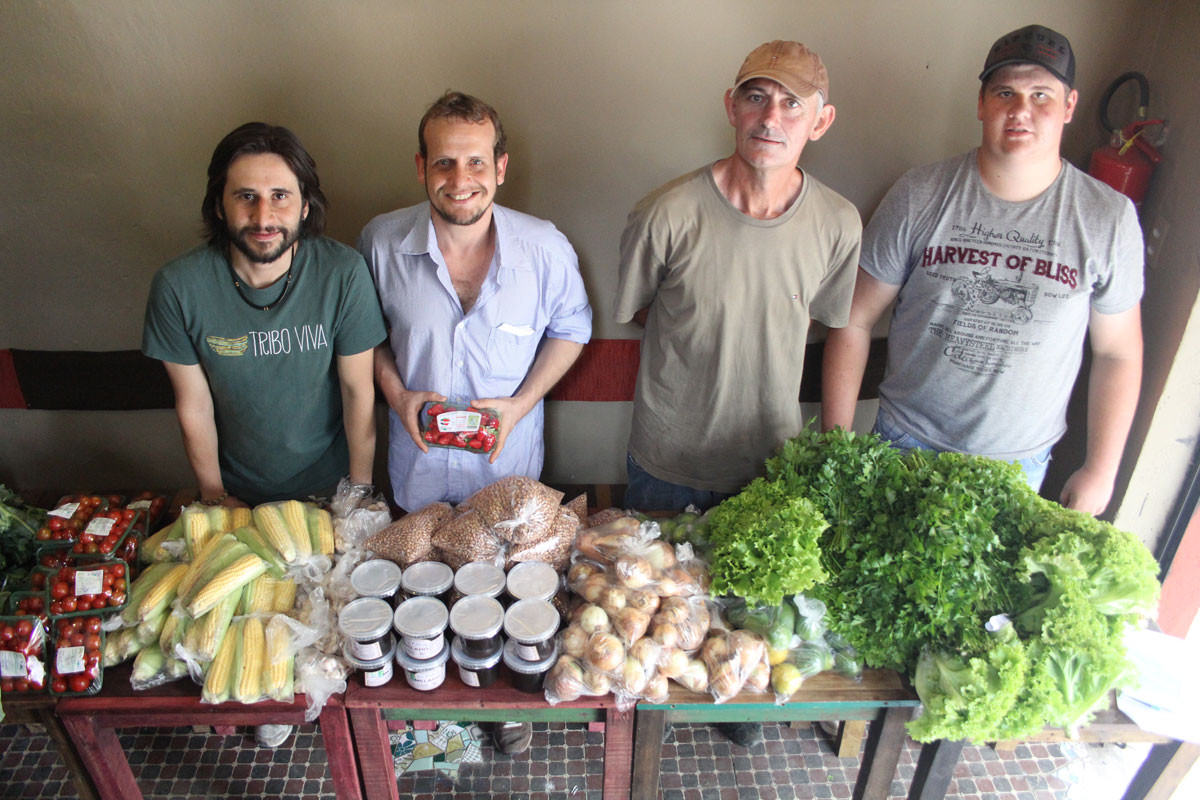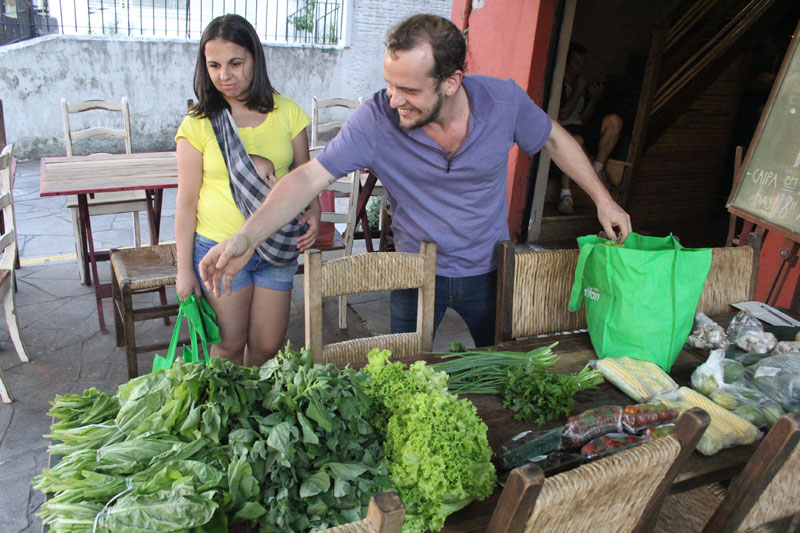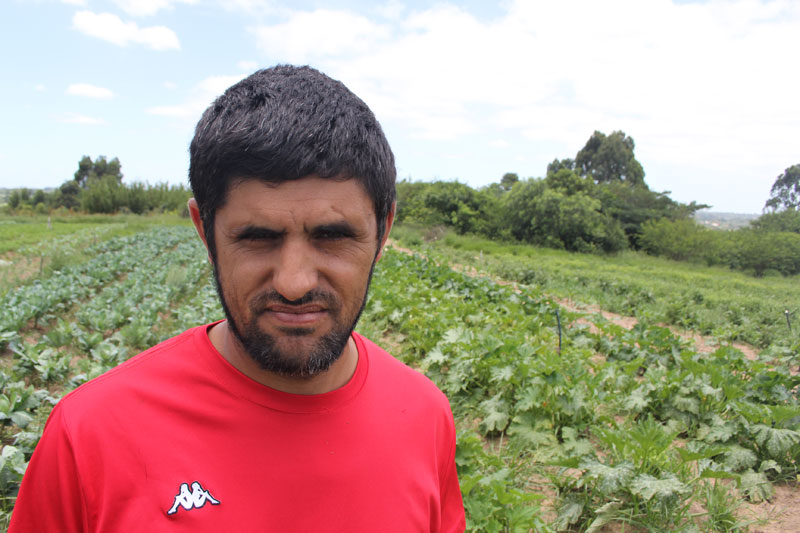Fresh, Local, On-Demand, and Cheap: A Brazilian Recipe for Change
As the organic movement takes off, two Brazilian entrepreneurs concoct a CSA remix.
Fresh, Local, On-Demand, and Cheap: A Brazilian Recipe for Change
As the organic movement takes off, two Brazilian entrepreneurs concoct a CSA remix.

Sounds like good news. Sounds like extra good news after a long year of bad news in Brazil. With an economy sinking ever deeper into recession, political chaos, and social unrest, the public mood has taken a sour turn. Justifiable, yes, says Pietro Rocha, a chef and entrepreneur in the southern city of Porto Alegre. Effective? Not really.
“People here are getting more cynical by the moment,” Rocha says, nursing a caipirinha on a warm afternoon outside his small restaurant, Espontâneo. “[But] it doesn’t resolve anything.”
Two heavy bags of organic summer bounty won’t fix Brazil alone. Tribo Viva – that’s Rocha’s new startup, through which people in Porto Alegre can get deals on local, organic produce – won’t fix Brazil alone either. But Rocha’s trying to do what he can.
Tribo Viva has been in the works for some years. Driven by a sense that The System is generally failing people, society, and the environment, Rocha and a partner, Marcos Delgado, whose background is in web design and advertising, began brainstorming around their passion for organic food after meeting about five years ago. Drawing inspiration from sharing economy startups like Airbnb, Kickstarter, and a Brazilian analogue, Catarse; the familiar CSA model; and web-savvier food initiatives like Australia’s Open Food Network, the pair went live with Tribo Viva this past July.
Rocha and Delgado bill their startup (Tribo Viva means “living tribe” in Portuguese) as a “collaborative consumption network.” The basic premise is simple: It’s a website that connects consumers in Porto Alegre with organic farmers in the region. The pair emphasize accessibility over profit and – by cutting out the distributors and retailers in the Brazilian food supply chain – are able to offer local, organic food far cheaper than it can be had in the grocery store. In many cases, it’s even cheaper than conventional produce in the grocery store. For example, Tribo Viva sells strawberries for 15 Brazilian reals (BRL) per kilogram, which is $1.70 in US dollars; at the grocery store, they go for twice that: 30 BRL.
That’s a win for Brazilians’ increasingly stretched pocketbooks, as well as human and environmental health in a country that’s recently become the world’s leading user of pesticides and herbicides – some of which are banned in the U.S. and Europe.
Like a CSA, Tribo Viva’s basic unit of sale is the batch: assortments of organic-certified vegetables, herbs, fruits, and juices that vary by season, availability, and supplier. Unlike the typical CSA, though, batches are available on demand.

Customers (for the record, as an American expat living in Porto Alegre, I am one) order and pay ahead of time through the website. Sales close about two days before the pickup, allowing suppliers time to harvest, prep and deliver. Pickup happens at set times at apartments or businesses scattered throughout the city, hosted by Tribo Viva’s network of “delivery coordinators,” who get a free batch in exchange for their work. There are now 15 coordinators, and a long waiting list ready to step up as the network (now at about 1,200 customers who have made at least one purchase) grows. All in all, it works sort of like a virtual farmers market/CSA mash-up, and as far as Rocha and Delgado have been able to find, there’s nothing else that works quite like it in the world.
At the moment, Tribo Viva sells food from eight farms or farmer cooperatives near Porto Alegre. Farmers decide what to include in a given batch and set the prices that Tribo Viva charges (the company supports itself with a small fee tacked onto each batch purchase). From a farmer’s perspective, Tribo Viva is advantageous over a traditional farmers market since everything they bring to town is already sold, and they don’t have to spend all day manning a booth.

“It’s been great for us. It’s excellent,” says Osmar José Bedende, who mostly grows vegetables on his farm in ViamÁ£o, about 30 miles east of Porto Alegre. Bedende now makes two weekly deliveries to the city, accounting for 10 to 20 percent of his total sales.
Despite receiving plenty of local press, Tribo Viva remains very small. Total weekly sales fluctuate, but averaged around 100 batches per week toward the end of 2015. At the same time, the organic movement is having a moment in Porto Alegre – much like what has occurred over the past decade or so in the U.S.. The Folha de Sao Paulo reports a 30 percent growth in sales of organic foods in 2014; 2015 is projected to see another 25 percent on top of that, landing at $2.5 billion in total sales.
“There’s been absurd growth,” says Fernanda Scur, a Tribo Viva delivery coordinator who’s been active in the organic scene here since the late ’90s. Case in point: In December, the huge distribution warehouse that supplies produce to much of Porto Alegre began carrying organic food.
Scur says Tribo Viva is one of a group of like-minded food ventures that are popping up around the country, as people increasingly “search for a solution that we can’t find in the current system … It’s all happening locally, through these small initiatives like Tribo Viva.”
In Rocha’s dreams, Tribo Viva someday becomes the Airbnb of organic food.
Momentum behind organics alone, though, doesn’t guarantee that an idea like Tribo Viva has staying power, and Delgado and Rocha are hard at work ironing out the kinks that inevitably arise when you’re dealing with so many moving parts.
“It’s very tough to develop the network and the logistics,” says Rocha, still pulling at his caipirinha.
They’ve made believers of themselves, though. They’re convinced they’ve got something innovative; they expect things to grow; they’re confident the model can change things. They believe it could replicate anywhere, and they’re eager to branch out beyond Porto Alegre. In Rocha’s dreams, Tribo Viva someday becomes the Airbnb of organic food – not just a fledgling Airbnb-inspired purveyor of organic food, little-known even in the second-tier Brazilian city where it was founded.
“We want it to be as big as it can be,” he says.
Follow us
This work is licensed under a Creative Commons Attribution-NoDerivatives 4.0 International License.
Want to republish a Modern Farmer story?
We are happy for Modern Farmer stories to be shared, and encourage you to republish our articles for your audience. When doing so, we ask that you follow these guidelines:
Please credit us and our writers
For the author byline, please use “Author Name, Modern Farmer.” At the top of our stories, if on the web, please include this text and link: “This story was originally published by Modern Farmer.”
Please make sure to include a link back to either our home page or the article URL.
At the bottom of the story, please include the following text:
“Modern Farmer is a nonprofit initiative dedicated to raising awareness and catalyzing action at the intersection of food, agriculture, and society. Read more at <link>Modern Farmer</link>.”
Use our widget
We’d like to be able to track our stories, so we ask that if you republish our content, you do so using our widget (located on the left hand side of the article). The HTML code has a built-in tracker that tells us the data and domain where the story was published, as well as view counts.
Check the image requirements
It’s your responsibility to confirm you're licensed to republish images in our articles. Some images, such as those from commercial providers, don't allow their images to be republished without permission or payment. Copyright terms are generally listed in the image caption and attribution. You are welcome to omit our images or substitute with your own. Charts and interactive graphics follow the same rules.
Don’t change too much. Or, ask us first.
Articles must be republished in their entirety. It’s okay to change references to time (“today” to “yesterday”) or location (“Iowa City, IA” to “here”). But please keep everything else the same.
If you feel strongly that a more material edit needs to be made, get in touch with us at [email protected]. We’re happy to discuss it with the original author, but we must have prior approval for changes before publication.
Special cases
Extracts. You may run the first few lines or paragraphs of the article and then say: “Read the full article at Modern Farmer” with a link back to the original article.
Quotes. You may quote authors provided you include a link back to the article URL.
Translations. These require writer approval. To inquire about translation of a Modern Farmer article, contact us at [email protected]
Signed consent / copyright release forms. These are not required, provided you are following these guidelines.
Print. Articles can be republished in print under these same rules, with the exception that you do not need to include the links.
Tag us
When sharing the story on social media, please tag us using the following: - Twitter (@ModFarm) - Facebook (@ModernFarmerMedia) - Instagram (@modfarm)
Use our content respectfully
Modern Farmer is a nonprofit and as such we share our content for free and in good faith in order to reach new audiences. Respectfully,
No selling ads against our stories. It’s okay to put our stories on pages with ads.
Don’t republish our material wholesale, or automatically; you need to select stories to be republished individually.
You have no rights to sell, license, syndicate, or otherwise represent yourself as the authorized owner of our material to any third parties. This means that you cannot actively publish or submit our work for syndication to third party platforms or apps like Apple News or Google News. We understand that publishers cannot fully control when certain third parties automatically summarize or crawl content from publishers’ own sites.
Keep in touch
We want to hear from you if you love Modern Farmer content, have a collaboration idea, or anything else to share. As a nonprofit outlet, we work in service of our community and are always open to comments, feedback, and ideas. Contact us at [email protected].by Andrew Jenner, Modern Farmer
January 19, 2016
Modern Farmer Weekly
Solutions Hub
Innovations, ideas and inspiration. Actionable solutions for a resilient food system.
ExploreExplore other topics
Share With Us
We want to hear from Modern Farmer readers who have thoughtful commentary, actionable solutions, or helpful ideas to share.
SubmitNecessary cookies are absolutely essential for the website to function properly. This category only includes cookies that ensures basic functionalities and security features of the website. These cookies do not store any personal information.
Any cookies that may not be particularly necessary for the website to function and are used specifically to collect user personal data via analytics, ads, other embedded contents are termed as non-necessary cookies.